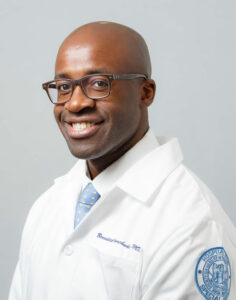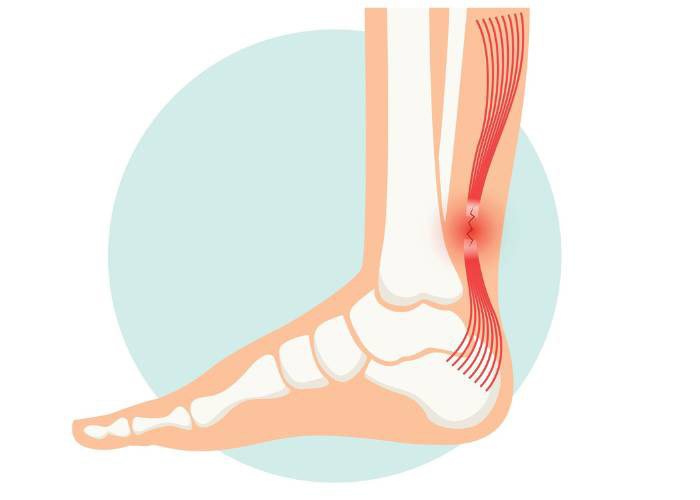Achilles Tendon Repair Surgeon

An Achilles tendon tear can cause pain in the back of the ankle, heel and foot. Some Achilles tendon tears can be treated with non-surgical therapies. However, complete Achilles tendon ruptures need to be repaired quickly in order to restore full function of the ankle, especially in high level athletes. Achilles ankle tear repair surgeon, Doctor Benedict Nwachukwu provides diagnosis and both surgical and nonsurgical treatment options for patients in Manhattan, New York City, NY who have an Achilles tendon rupture or tear. Contact Dr. Nwachukwu’s team today!
What is an Achilles tendon tear or rupture?
The calf muscles join together near the ankle and form a single fibrous tendon cord. This tendinous cord is the Achilles tendon that attaches to the calcaneus (heel bone). The Achilles tendon is primarily responsible for lifting the heel off of the ground. When the foot is suddenly pushed upward in certain maneuvers, the Achilles tendon can partially or completely tear away from its attachment site on the heel bone. In some cases, the Achilles tendon rupture can occur in the middle portion of the tendon causing the tendon to split into two separate parts. Athletes that participate in high-endurance sports, such as tennis, basketball, skiing, and/or snowboarding, have the highest likelihood of sustaining an Achilles tendon tear or rupture. Individuals with a suspected Achilles tendon rupture typically report heel pain and reduced push-off strength.
What is the treatment for an Achilles tendon tear or rupture?
Patients with partial Achilles tendon tears that do not interfere with performing normal daily activities may benefit from non-surgical therapies alone. Non-surgical treatments are tailored to the patient’s specific needs and usually include some combination of shoe wear adjustment (sometimes a CAM boot is required), activity modifications, non-steroidal anti-inflammatory medications (NSAIDs), and a physical therapy program. In select cases a biologic injection such as platelet rich plasma (PRP) can be trialed to help with the healing of a partial tear.
Surgical intervention is usually the recommended treatment to restore the full function of the Achilles tendon. Surgical repair of the Achilles tendon is accomplished by suturing the torn tendon ends back together and, in some cases, reattaching the tendon back to the heel bone. Dr. Benedict Nwachukwu, orthopedic ankle specialist serving Manhattan, Brooklyn, New York City, and surrounding New York boroughs is highly trained and experienced in performing Achilles tendon repair and/or reconstruction surgery.

How is an Achilles tendon repair performed?
Dr. Nwachukwu will typically perform an Achilles tendon repair as an outpatient procedure using a nerve block for anesthesia. The surgery is done by creating a minimally invasive incision along the posterior lower leg over the torn portion of the Achilles tendon. An open incision not only gives Dr. Nwachukwu access to the Achilles tendon but allows visualization of the surrounding muscles and soft tissue structures while completing the necessary repair. When the ruptured portion of the Achilles tendon is located, if there are unhealthy parts of the tendon the unhealthy portion of the tendon is cleaned up. The remaining healthy tendon is sutured back together or reattached to the calcaneus.
On occasion, there may be an extended period of time between the initial injury and surgical repair resulting in significant retraction of the Achilles tendon. A tendon graft is usually necessary for these particular circumstances to lengthen the tendon or to reconstruct it entirely. Dr. Nwachukwu often implements the flexor hallucis longus (FHL) tendon harvested from the patient’s big toe. When the tendon graft is successfully integrated with the native Achilles tendon, it is evaluated for tension and strength, and the incision is closed with sutures.
What is the recovery period like after an Achilles tendon repair?
The recovery period following an Achilles tendon repair is contingent on the severity of the precipitating injury and the complexity of the surgical repair. The majority of patients in Manhattan, Brooklyn, New York City and surrounding New York boroughs can anticipate a full recovery in approximately 9 months with continued improvement over the following 3 to 6 months. In general, the following can be expected during the recovery process:
- The numbing sensation from the nerve block can persist 8 to 24 hours after surgery.
- A splint or cast is applied to the lower leg immediately following surgery.
- Walking with the assistance of crutches or a knee scooter as bearing weight on the repaired leg should be avoided for the first two weeks after surgery.
- The physical rehabilitation program is tailored to the patient’s specific injury and typically begins 2 weeks after surgery. The patient will work closely with the physical therapy team to gradually strengthen the ankle and improve range of motion. The key to a successful recovery following an Achilles tendon repair is adhering to and completing the physical therapy protocol.
Achilles Tendon Q&A
1. What is the recovery time for Achilles tendon repair?
The recovery time following an Achilles tendon repair will vary based on the patient’s health history, underlying conditions and severity of the Achilles tear. In general, patients who undergo Achilles tendon surgery will need to allow the tendon to heal. They can typically expect to be in a walking boot or cast for 6 weeks post-surgical repair.
Return to sport can be managed at about 9 months and depends greatly on the type of injury and the patient’s willingness to commit to a detailed physical therapy protocol.
2. Can high-level athletes return to sport after an Achilles tendon rupture?
Dr. Nwachukwu is asked this question often and the answer is yes, most of the time. 85% of high-level athletes return to sport as strong, if not stronger after a successful repair and physical therapy regimen. It’s important not to rush the process and to give the tendon time to heal completely and become strong again.
3. What are the risks of Achilles tendon surgery?
For high-level athletes the biggest concern is re-tear or re-rupture of the Achilles tendon. The good news is this is rare for properly rehabilitated tendon tears and occurs fewer than 5% of the time with a repair.
Other typical concerns involve calf weakness, post-surgical complications, infection, bleeding or continued pain after the repair. Luckily all of these are uncommon and Dr. Nwachukwu can discuss your concerns before surgery.
4. Can physical therapy help with Achilles tendon repair?
Physical therapy is key for both partial tears that don’t require surgery and full tears that require Achilles tendon repair. The goal of physical therapy is to strengthen the supporting muscles and tendon. Physical therapy also helps the tendon heal properly, reduce scar tissue and stay flexible.
5. Can I go without surgery for an Achilles tendon tear?
The severity of the injury is often the indicating factor when deciding on a surgical option. The Achilles tendon is important to ankle stability, walking, standing, moving and performing everyday tasks. Minor tears do not require surgery, where full tears, or serious injuries make surgery a necessity.
6. How can I avoid or prevent an Achilles tendon injury?
STRETCH! A careful regimen of stretching pre and post workout is the best defense against tendon injuries. Stretching will warm up the muscles and make the Achilles work and move more easily. Strengthening the calf muscles will also help support the Achilles tendon. Make sure you vary your activity and choose the appropriate footwear.
7. How painful is the recovery after an Achilles tendon repair?
Achilles tendon pain post-surgery is normal and can be managed with medications that are used as directed. RICE (Rest, Ice, Compression, Elevation) will help alleviate symptoms and reduce swelling. Pain will decrease over the initial few weeks following the operation. Some pain is to be expected and can last for as long as 3-4 weeks following the surgery. Severe pain or significant pain that keeps you from participating in the physical therapy protocol should be discussed with Dr. Nwachukwu.





